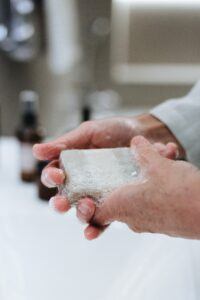
One in four people in the US have skin problems, 60 per cent in the UK, so it’s no surprise that holidaymakers take their own soap with them on holiday? Their problems could be anything from rosacea to psoriasis and eczema, and ordinary soaps found in hotels and bed and breakfast places just wouldn’t help, but would in fact aggravate the problem.
I’ve often asked myself if I needed to take a soap with me what would it be? Luckily I don’t have any skin problems, but the answer would be the lemony soap that I can’t get enough off. I use it to wash my hands when I shower. I’m hooked on lemon zest fragrance.
Don’t Accept Cheap Soap
However, there are more pressing reasons why people take their own soap on holiday. It could be that they need a soap that doesn’t irritate their skin, maybe they want a soap that can deal with their dry hands, or they just don’t want to wash their hands with cheap hotel soap.
Liquid Soap Doesn’t do it For me – It’s All Gooey
 One recent place I stayed in, a budget hotel, didn’t even have bar soap. It was liquid soap, which I didn’t particularly like. For me it’s all gooey and I didn’t get the feel of real lather when not using a bar of soap that can really clean my hands, face or body.
One recent place I stayed in, a budget hotel, didn’t even have bar soap. It was liquid soap, which I didn’t particularly like. For me it’s all gooey and I didn’t get the feel of real lather when not using a bar of soap that can really clean my hands, face or body.
The liquid soap was half full which I thought was disgusting. I dread to think what they would have done if they had used bar soap – would they have left half a bar of soap?
What Ingredients is Soap Made From? It’s Good to Know
We know what soap is used for – it’s for personal hygiene – to remove sweat and dirt from your skin, but understanding what it’s made of might give you an idea of what type you need or is good for you. Ingredients for soap are fat or oil mixed in with an alkali. The oil comes from a plant or animal, while the alkali is a chemical called lye. When making bar soap, the lye is sodium hydroxide. For liquid soap its potassium hydroxide. Heating oil and lye results in soap. This chemical reaction is called saponification. Without lye, saponification isn’t possible, so lye is necessary to create soap.

An Alternative For Those With Dry Skin Has to be Found
It could be that you may suffer from a dry skin condition. One that has been used for hundreds of years is Bamboo Charcoal Soap. It might not be good to look at, but it’s non-toxic and perfect for sufferers of eczema and dry skin.
The great thing about bamboo charcoal soap is that it is a cleanser which means it absorbs toxins, impurities and free radicals. In effect it kills all viruses, making the skin look healthier. There are other soaps which offer similar benefits. I guess it it’s a question of trial and error before you find the one that works for you. Tumeric soap claims to produce a skin that’s smooth and give a youthful glow. It might be worth a try.
- This post contains affiliate links that I earn a small commission from at no cost to you.
Soap That Irritates Your Skin Should be Shelved
On occasions I’ve told my wife to use baby soap products to avoid harmful substances that may irritate her skin. But even some baby soaps can contain formaldehyde, a preservative that can cause skin, eye and lung irritation. Best thing to do is always check the ingredients which are printed on the box. Not all soaps are alike, so do make the effort and read the small print. This can trigger in babies eczema, which is inflamed and irritated skin. This is especially common with babies and young children who already have allergies or asthma.
Check Out The Ingredients That go Into Your Soap.
One ingredient that you need to steer clear of which is found in soaps is Sodium Lauryl Sulfate (SLS). It can cause irritation to those with a sensitive skin, so should be avoided.
Other Toxic Ingredients Found in Soap Include:
- Most hand soaps contain fragrances
- Sodium Laureth Sulfate (SLES)
- Methylisothiazolinone & Methylchloroisothiazolinone
- Cocamidopropyl betaine
How do I Know if my Soap is Irritating?
- red rash.
- mild to severe itching.
- blisters that may ooze or crust over.
- dry, cracking, or scaly skin.
- tender skin.
- burning skin
Which Soap is Good For You? And Which One is Bad?
Cetaphil’s Gentle Cleansing Bar is recommended by dermatologists, and it’s one of Dr. Klein’s favorite soaps for dry skin. It’s unscented and hypoallergenic, thus safe for the face and body. It’s also gentle enough to use every day on eczema or rash-prone skin.
Conclusion
I’m lucky enough not to have an allergy or sensitive skin or get rash from using soap, so I can get away with using most soaps. However, for me, as I have said before, I do like a soap with a lemony zest. Also, it has to be one that lathers quickly, so that I can get the job done. Soap, I guess is like any product, you have to find the one you like and the one that likes you.
However, remember that experts are still in the dark as to what causes eczema and psoriasis, and that as well as allergies, environmental and genetic factors also need to be taken into account. So you may have to contact your doctor if either of those conditions flare up and they may have to refer you to a dermatologist.
I hope this article has been of some help. I always like to get feedback. This can be useful in improving the article and getting more information that may have been missed. Have fun and keep bubbling.

